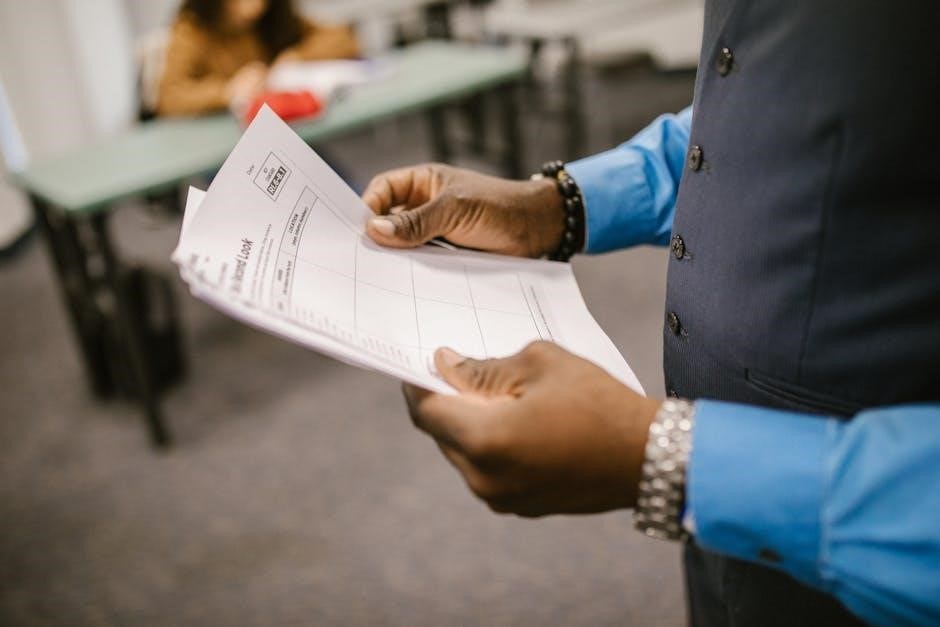Behavioral Interviews for Software Engineers⁚ A Comprehensive Guide
This guide provides a comprehensive overview of behavioral interviews for software engineers, crucial for landing your dream role. We explore common questions, effective response strategies, and techniques to showcase your skills and experience, increasing your chances of success. Downloadable resources are also available to aid your preparation.
Understanding the Purpose of Behavioral Interviews
Behavioral interviews for software engineers aren’t just about assessing technical skills; they delve into how you’ve handled past situations, revealing your problem-solving approach, teamwork capabilities, and overall personality. Unlike technical interviews focusing on coding prowess, behavioral interviews aim to predict your future performance based on your past behavior. Companies use this method to gauge your cultural fit, assessing whether your work style aligns with their team dynamics. They look for evidence of key soft skills like communication, collaboration, conflict resolution, and adaptability, all crucial for success in a collaborative software development environment. The goal is to determine if you can navigate challenges, learn from mistakes, and contribute positively to the team’s overall success.
Interviewers analyze your responses to understand your thought processes, decision-making abilities, and how you react under pressure. They seek candidates who demonstrate resilience, initiative, and a proactive approach to problem-solving. This insight provides a holistic view of your capabilities, supplementing the technical assessment and offering a more complete picture of your potential as a valuable team member. By understanding the purpose of these behavioral questions, you can prepare more effectively, crafting responses that showcase your strengths and highlight your suitability for the role.
Common Behavioral Interview Questions for Software Engineers
Behavioral interview questions for software engineers often revolve around scenarios testing specific skills. Expect questions probing your problem-solving abilities (“Describe a time you faced a complex technical challenge”), teamwork experiences (“Tell me about a time you had to collaborate with a difficult team member”), and conflict resolution skills (“How did you handle a disagreement within a team?”). Questions about handling failure (“Describe a project that didn’t go as planned, and what you learned”) are common, assessing your ability to learn from setbacks. Your leadership style might be explored (“Give an example of a time you mentored a junior engineer”), and your ability to adapt to change (“Describe a time you had to adapt to a significant change in project requirements”).
Expect questions about your approach to deadlines (“Describe a time you had to meet a tight deadline under pressure”), and how you handle ambiguity (“Tell me about a time you had to work with incomplete information”). Questions focusing on initiative (“Describe a time you took initiative to improve a process”) and prioritization (“How do you prioritize tasks when faced with multiple competing demands?”) are also standard. These questions help interviewers assess not only your technical capabilities but also your soft skills, crucial for success in a fast-paced and dynamic software development environment. Preparation is key; anticipating these common questions allows you to structure thoughtful and compelling responses.
The STAR Method⁚ Structuring Your Responses
The STAR method provides a structured approach to answering behavioral interview questions effectively. STAR is an acronym for Situation, Task, Action, Result. When responding, begin by describing the Situation⁚ set the context, providing relevant background information. Clearly define the Task⁚ explain the challenge or problem you faced. Detail the Action you took⁚ describe your specific steps and contributions, emphasizing your role and decisions. Finally, articulate the Result⁚ explain the outcome of your actions, quantifying your achievements whenever possible. Using this framework ensures your responses are clear, concise, and highlight your skills and accomplishments.
For example, if asked about a time you handled a conflict, using STAR, you would describe the situation (a disagreement arose during a project), the task (resolve the conflict and maintain team cohesion), the action (you facilitated a meeting, listened to each side, identified common ground, and proposed a compromise), and the result (the conflict was resolved, team morale improved, and the project progressed successfully). This structured approach makes your responses easy to follow and demonstrates your problem-solving skills and ability to communicate effectively. Consistent use of the STAR method helps to structure your answers, making them impactful and memorable for the interviewer.
Preparing for Common Questions⁚ Examples and Strategies
Anticipating common behavioral interview questions is key to a successful interview. Prepare specific examples showcasing your skills using the STAR method. Questions often focus on teamwork, problem-solving, leadership, and handling pressure. For teamwork, describe a collaborative project, highlighting your contributions and how you resolved conflicts. When discussing problem-solving, explain a complex technical challenge, outlining your analytical process and the solution you implemented. To illustrate leadership, describe a project where you guided a team, detailing your strategies and the positive outcomes. For handling pressure, share an example of a stressful situation, explaining how you managed time constraints and delivered results under pressure. Practice articulating your responses clearly and concisely, focusing on quantifiable achievements whenever possible. Prepare for questions about your weaknesses, focusing on areas you’re actively improving. Highlight your self-awareness and proactive approach to professional development. Remember to tailor your responses to the specific company and role, researching the company culture and values beforehand. By preparing thoroughly, you project confidence and demonstrate your suitability for the position.
Addressing Situational Questions⁚ Conflict Resolution and Teamwork
Behavioral interviews frequently assess your ability to navigate challenging situations, particularly those involving conflict resolution and teamwork. Prepare examples demonstrating your skills in these areas. For conflict resolution, describe a scenario where disagreements arose within a team. Detail your approach to mediating the conflict, emphasizing active listening, clear communication, and finding mutually agreeable solutions. Highlight your ability to remain professional and objective, focusing on the task at hand rather than personal feelings. For teamwork questions, focus on collaborative projects where you played a key role. Describe your contributions to the team’s success, highlighting instances where you supported team members, shared your expertise, and contributed to a positive team dynamic. Emphasize your ability to work effectively with diverse personalities and skill sets, achieving common goals despite potential differences. Showcase instances where you proactively sought input from others, collaborated effectively, and celebrated shared accomplishments. Remember to quantify your contributions whenever possible, providing concrete examples of your impact on the project’s success. These examples will demonstrate your valuable contributions to a team environment.
Highlighting Technical Skills Through Behavioral Examples
While technical proficiency is assessed through coding challenges, behavioral interviews offer a chance to demonstrate your technical skills indirectly. Prepare examples showcasing your problem-solving abilities, technical expertise, and learning agility within a team environment. Discuss a situation where you had to debug a complex issue, detailing your systematic approach, the tools you utilized, and the successful resolution. Emphasize your analytical and critical thinking skills, explaining how you identified the root cause of the problem and implemented an effective solution. Highlight instances where you learned a new technology or programming language to overcome a technical challenge. Describe your learning process, the resources you used, and how quickly you integrated the new skill into your workflow. Showcase projects where you took ownership of a technical task, demonstrating initiative, responsibility, and the ability to deliver results within deadlines. Quantify your achievements where possible; for instance, mention improvements in system performance, reduced development time, or successful implementation of a new feature. These examples will effectively demonstrate your technical acumen and its practical application within real-world scenarios, bolstering your candidacy.
Navigating Difficult Questions⁚ Handling Failure and Challenges
Behavioral interviews often include questions designed to assess how you handle setbacks and challenges. Instead of fearing these questions, view them as opportunities to demonstrate resilience, learning agility, and self-awareness. When discussing a failure, focus on the lessons learned and the growth that resulted. Explain the situation, your role in the event, the specific actions you took, and the outcome. Highlight what you learned from the experience and how you applied those lessons in subsequent projects. Emphasize your ability to adapt to unexpected circumstances and your capacity for self-reflection. Frame your response positively by emphasizing problem-solving skills, resourcefulness, and the ability to learn from mistakes. Avoid placing blame on others; instead, take ownership of your actions and demonstrate accountability. Show that you can analyze failures constructively, identifying areas for improvement and implementing corrective measures. Prepare specific examples showcasing your ability to navigate difficult situations, overcome obstacles, and emerge stronger. This approach transforms potentially negative experiences into demonstrations of personal and professional growth, enhancing your credibility as a candidate.
Practicing and Refining Your Responses
Effective preparation is key to acing behavioral interviews. Don’t just mentally rehearse your answers; actively practice them aloud. This helps refine your delivery, ensuring a natural and confident presentation. Record yourself answering common questions to identify areas for improvement in clarity, pacing, and overall impact. Solicit feedback from friends, mentors, or career counselors. Their perspectives can reveal blind spots and suggest ways to strengthen your responses. Consider using the STAR method (Situation, Task, Action, Result) to structure your answers, ensuring a clear and concise narrative. Practice tailoring your responses to specific company values and the requirements of the role. Research the company culture and identify key qualities they emphasize. Align your responses to showcase those qualities, demonstrating your understanding of their organizational needs. The more you practice, the more comfortable and confident you’ll become. This preparation will significantly enhance your ability to articulate your experiences and skills effectively, increasing your chances of a successful interview outcome. Remember, practice isn’t just about memorizing answers; it’s about developing a natural and compelling way to showcase your strengths.
Increasing Your Chances of Success⁚ Post-Interview Reflection
After each behavioral interview, dedicate time to thoughtful reflection. This isn’t merely about reviewing how you felt; it’s about analyzing your performance objectively. Document your responses to key questions. Identify areas where you felt confident and those where you struggled. Analyze the effectiveness of your STAR method application. Were your answers clear, concise, and compelling? Did you effectively highlight relevant skills and experiences? Consider what you could have improved. Could you have provided more specific examples? Did you fully address the interviewer’s underlying concerns? Review the job description and company information again, ensuring alignment between your answers and their requirements. Note any questions you were unprepared for, and research those topics thoroughly for future interviews. This post-interview analysis helps identify patterns in your responses and refine your approach for subsequent interviews. It allows for continuous improvement, transforming each experience into a valuable learning opportunity. By consistently reflecting and refining your strategy, you significantly increase your chances of success in future behavioral interviews.



About the author